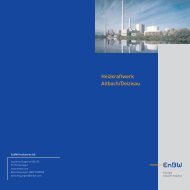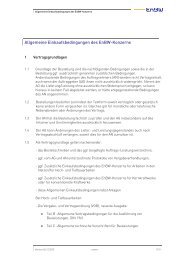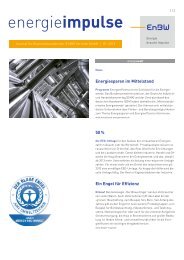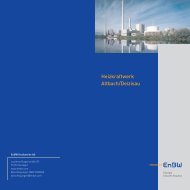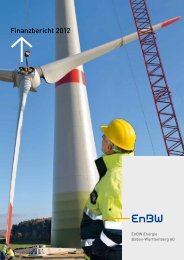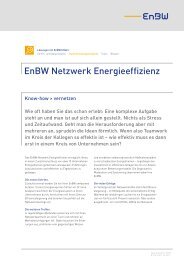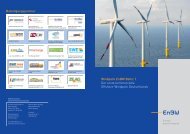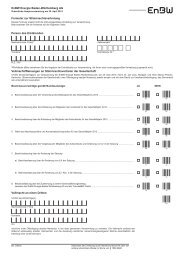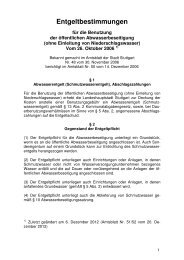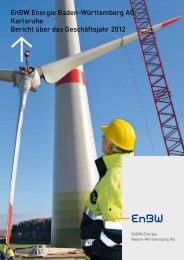2008 I 2009 Sustainability Report - Econsense
2008 I 2009 Sustainability Report - Econsense
2008 I 2009 Sustainability Report - Econsense
Create successful ePaper yourself
Turn your PDF publications into a flip-book with our unique Google optimized e-Paper software.
Political framework<br />
Despite the financial and economic crisis,<br />
climate protection remained one of the core<br />
areas of German and European legislation<br />
during the period under review. This culminated<br />
in the adoption of the Integrated Climate<br />
and Energy Package/"Green Package" in<br />
Brussels in December <strong>2008</strong>. The aim of the<br />
measures outlined therein is to reduce<br />
greenhouse gas emissions in the European<br />
Union by 20% compared to 1990 reference<br />
levels by the year 2020. If the other major<br />
economic regions commit to targets of a<br />
similar magnitude in an international agreement,<br />
the reduction target is to be upgraded<br />
to 30%. Trading with CO 2 emission certificates<br />
is the central instrument in the endeavour<br />
to achieve these goals. The primary<br />
addressees of this policy are energy producers<br />
and industrial companies, who have to<br />
acquire certificates for their CO 2 emissions.<br />
The volume of certificates is limited and decreases<br />
over time. Companies can trade the<br />
certificates with each other to balance out<br />
increased or reduced emission needs. The<br />
key effect of emissions trading is the creation<br />
of a market price for CO 2 emissions.<br />
This provides companies with a marketbased<br />
incentive to cut greenhouse gas emissions.<br />
10<br />
The system of emissions trading was introduced<br />
back in 2005. The Emissions Trading<br />
Period in the "Green Package" governs the<br />
third trading period from 2013 to 2020. It<br />
will lead to a "Europeanisation" of emissions<br />
trading, as the certificates will no longer be<br />
allocated nationally but by the European<br />
Commission. The reduction in emission limits<br />
is not the only regulatory factor that imposes<br />
stricter conditions on the electricity<br />
industry; in future, energy companies will<br />
also have to purchase the emission certificates<br />
they need. This is expected to make the certificates<br />
more expensive and therefore to also<br />
result in higher electricity prices. In contrast,<br />
the certificate auction process for industrial<br />
companies will be introduced step by step.<br />
Industrial sectors competing on the international<br />
stage will still be able to acquire up to<br />
100% of the certificates they need free of<br />
charge, although under the new rules allocation<br />
will be based on the 10% of most efficient<br />
companies in the sector in question.<br />
The EU Commission intends to stipulate the<br />
affected sectors and the exact procedures by<br />
2010. At least 50% of the proceeds from<br />
emissions trading are to be spent on climate<br />
protection measures.<br />
A further key element in the European<br />
"Green Package" is the Directive on Renewables<br />
– which stipulates that renewables<br />
must account for 20% of all energy consumed<br />
in the EU by 2020. This applies not<br />
only to electricity consumption but also to<br />
heating and transport. The member states<br />
must draw up national plans of action outlining<br />
how they intend to meet this target.<br />
The EU states can choose the instruments<br />
they employ to meet the target, which<br />
means the provisions do not impact the<br />
German Renewables Act (EEG). In 2007, the<br />
share of renewables in overall energy consumption<br />
was just 8.6%, and this gives some<br />
indication of the significant growth that will<br />
be necessary on this front. The German<br />
government has the power to decide how to<br />
split the target between the various sectors –<br />
like electricity, heating or transport.<br />
A further EU Directive deals with the capture<br />
of CO 2 from the waste gases of coal-fired<br />
power plants as well as the subsequent underground<br />
storage of this gas (CCS – carbon<br />
capture and storage). It lays down a framework<br />
for the technology to be developed for<br />
this purpose and requires that new coal-fired<br />
power plants be designed in such away that<br />
suitable technology can be retrofitted. To<br />
promote this goal, it is making funding available<br />
from emissions trading for 12 demonstration<br />
projects. At the present time,<br />
however, the formulation of German CCS<br />
legislation is being held up by differences of<br />
opinion between the parties that form the<br />
national government as well as between the<br />
national government on one side and the regional<br />
state governments on the other.<br />
The final, voluntary target concerns energy<br />
efficiency in Europe, which is to increase by<br />
20% by the year 2020 compared to a reference<br />
scenario. Meanwhile, the European<br />
Ecodesign Directive already in force is paving<br />
the way for the first successes on the energy<br />
efficiency front. The regulations on the replacement<br />
of conventional light bulbs by energy-saving<br />
bulbs made waves throughout<br />
the EU. This year, the sale of 100-watt standard<br />
and opaque light bulbs will be prohibited,<br />
and this ban will be extended to cover all<br />
bulb wattages step by step. In Germany in<br />
particular, the ban unleashed fierce debates<br />
about lighting quality and lamp design, underlining<br />
the lack of general faith in the ongoing<br />
technical development of illumination<br />
alternatives. Other regulations – such as those<br />
governing the energy consumption of refrigerators<br />
and freezers, television sets and television<br />
reception devices, street lighting and<br />
external power packs as well as new provisions<br />
to reduce the power consumption of<br />
appliances in standby mode – managed to<br />
generally avoid the headlines. The regulations<br />
on the energy consumption of electric<br />
motors in industry are expected to be particularly<br />
effective.<br />
The German government and the Bundestag<br />
parliament also devoted a great deal of time<br />
to climate protection policy and to address-



